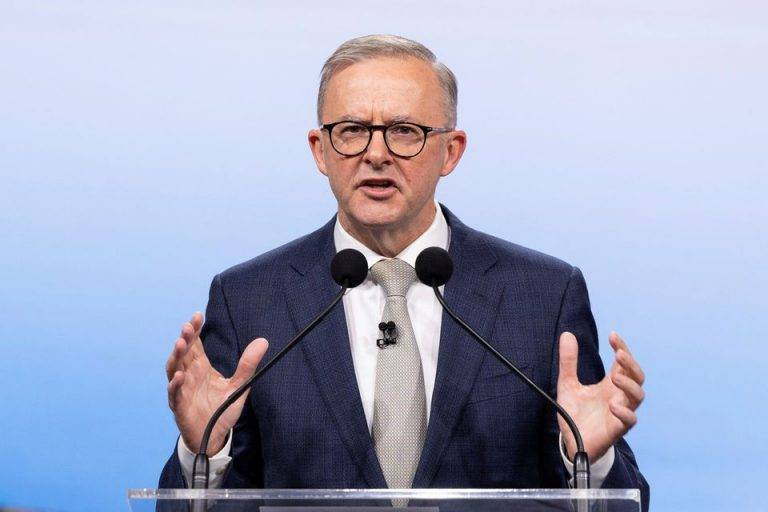When Australian opposition leader Anthony Albanese was only 12 years old, he says, he helped to organise a rent strike that kept his mother’s public housing property from being sold off to developers.
The campaign of his Labor Party, favoured by polls to oust Prime Minister Scott Morrison in this month’s general election, is spotlighting Albanese’s working-class bona fides and his image as a pragmatic unifier, in hopes of sidestepping divisive policy debates that eroded its lead in the last nationwide vote.
But this cautious stance, resting heavily on his humble beginnings and long years of public service, has bumped into unexpected risks on the campaign trail, where the media has fixated on perceived policy gaffes when he lacked details on the unemployment rate and his party’s disability insurance plan.
“I was a bit surprised that he didn’t seem as prepared at the very beginning for the intensity of a campaign,” said John Phillimore, executive director for the John Curtin Institute of Public Policy.
“But there’s campaigning and there’s ‘what’s the ability of the person to be in government?’ As a governing style, he’d probably have a reasonably strong team approach.”
Albanese, 59, entered parliament in 1996 – just as Labor entered the first of two decade-long patches in the opposition. The party’s time back in power, from 2007 to 2013, was marred by leadership squabbles in which he openly criticised both sides.
Those years forged his reputation as a collaborator willing to work outside ideological lines, as Leader of the House where he managed government business in the parliament.
After losses in the 2010 election, Labor was saddled with the country’s first minority government in 70 years, requiring it to win support from conservatives or independents to pass laws. But by one measure cited by political commentators – the number of laws passed compared to the number of days in office – it turned out to be Australia’s most productive parliament.
“There was an attempt to create chaos, but what Anthony did was to ensure that the work of government proceeded,” said Craig Emerson, who was trade minister in that government.
Those who know Albanese say he is genuinely motivated by the mix of pragmatism and concern for social justice he gained during his childhood struggles, such as when he complained to a councilman about his mother’s broken stove while a teenager.
“It gave me a determination, each and every day, to help the people like I was, growing up, to have a better life,” Albanese told the National Press Club in January, recalling how he at times depended on neighbours for food when his mother, who relied on a disability pension, was unable to provide for him.
Morrison, the conservative prime minister, seldom refers to his middle-class suburban upbringing.
CAUTIOUS INSTINCTS
Adding to cautious instincts on both sides ahead of the May 21 election, leaders are leery of spooking voters with talk of major policy shifts at a time when pandemic, war, inflation, climate change, and an increasingly assertive China have left voters keen for reassuring voices.
Opinion polls have showed Labor maintaining a mid-single digit lead in the polls, but three years ago Labor blew a similar lead, and polls also show Morrison is slightly more popular than Albanese.
Media have seized on Albanese’s stumbles on policy details and forgetting the unemployment rate on the first day of the six-week campaign, undermining his credibility as Labor pledged to improve job security for casual workers and create hundreds of thousands of green energy roles in the transition away from fossil fuels.
The government, however, has also faced bad press in the conservative party’s traditional areas of strength – national security and the economy – hit first by the Solomon Islands signing a security pact with China and then by the first rise in interest rates in more than a decade, due to surging inflation.
Rising numbers of climate-concerned voters in affluent parts of Sydney and Melbourne have meanwhile embraced environment-focused independent candidates in traditionally conservative seats, prompting speculation that neither party may win an outright majority and raising the prospect of another minority government.
For Albanese, succession to the prime minister’s office would cap a career that began with the rent strike of his childhood and involvement in student politics, when he studied economics as the first in his family to attend university.
At 22, he was elected president of Young Labor, the party’s youth wing, and worked as a research officer under the economic reformist government of Bob Hawke, Labor’s longest-serving prime minister.
“Anthony has … a capacity to look beyond the party political alignment,” said Robert Tickner, a former Labor member who took the teenage Albanese’s call about his mother’s stove.
“(He) believes in this idea that there are people of good will in the community,” Tickner said in a phone interview. “He’s not someone who’s a sectarian.”
Reuters



No comments yet
Be the first to share your thoughts!